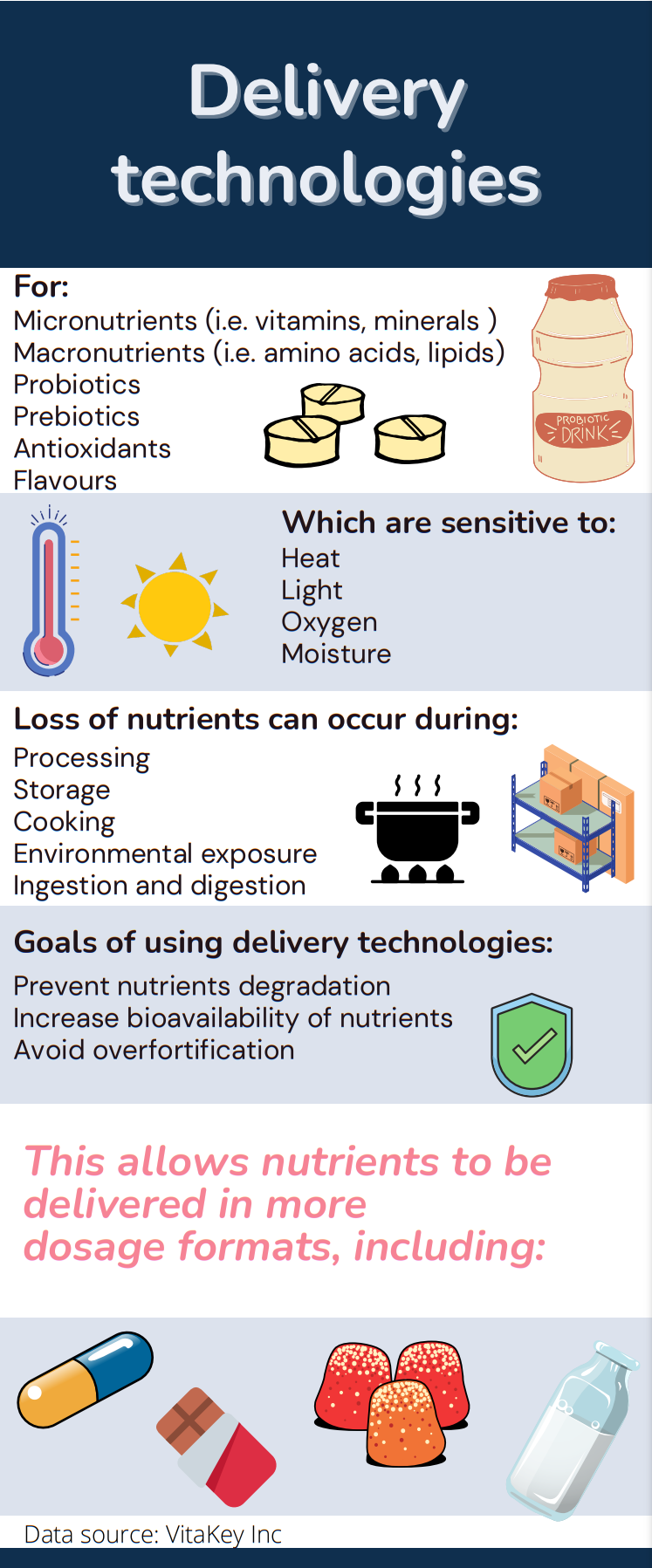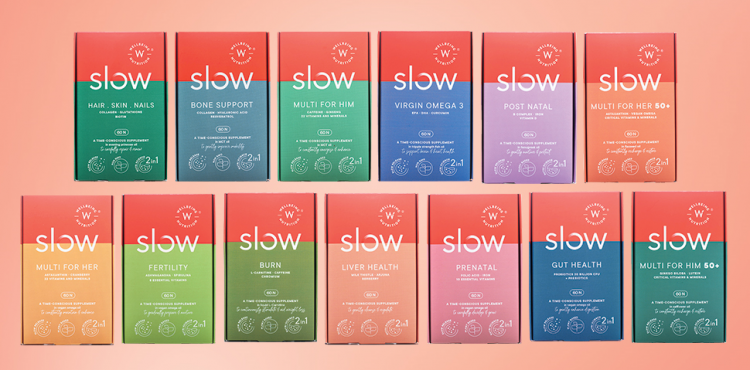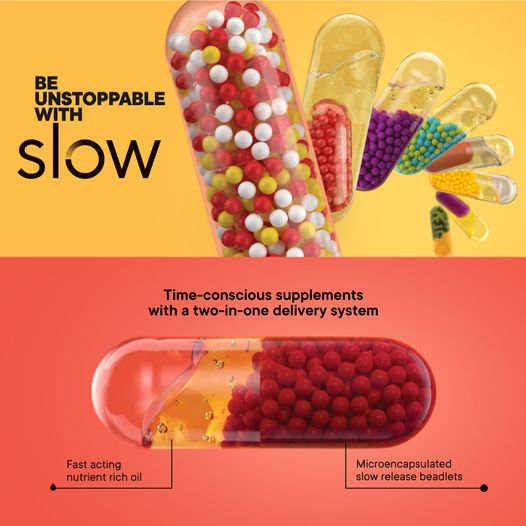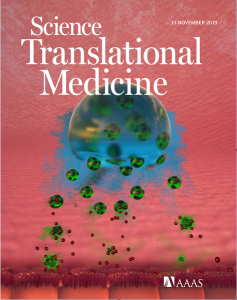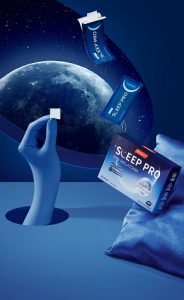VitamINSIGHTS – Delivery system innovation
‘Now is the time’: Moderna co-founder and nutra experts on why delivery system innovation is key for industry growth
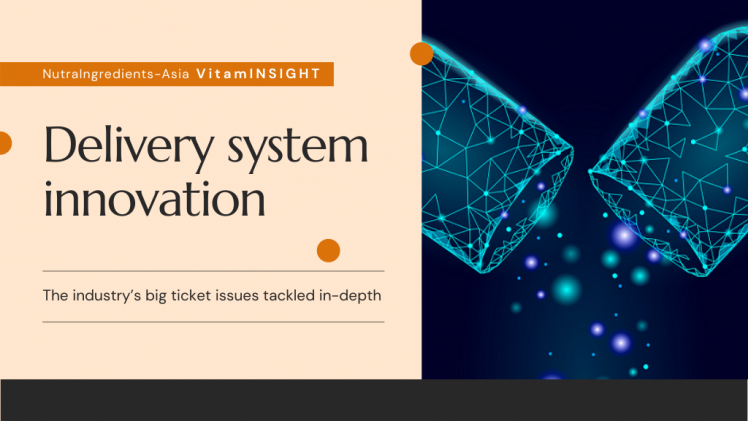
This is according to a raft of industry players, including a co-founder of Moderna who has also been working on nutrient delivery systems in the supplement and food industries via the firm VitaKey Inc – which is working with firms such as New Zealand’s Fonterra on probiotics delivery systems.
This series of VitamINSIGHTS will also include insights from India’s Wellbeing Nutrition, China’s dietary supplement giant BYHEALTH and more.
The problem
Not only is delivery system crucial in preventing nutrient degradation, it is also crucial for the precise delivery of nutrients, said Dr. Robert S. Langer, the co-founder of biotech firm Moderna – one of the giants behind the novel mRNA COVID-19 vaccines.
Known for his groundbreaking work in new drug delivery systems across cancer, diabetes medications, Dr. Langer, who is also one of the 12 institute professors at the Massachusetts Institute of Technology (MIT) – the highest honour at MIT, has set his eyes on innovating nutrient delivery systems for different food matrix as well.
This is done through his work at VitaKey – a biotech firm which he has co-founded and was in the spotlight a few months ago for its partnership with Fonterra in probiotics delivery technology.
In the world of functional foods and dietary supplements, common factors that could degrade nutrients include exposure to heat, light, and pH during the product processing, storage process.
“One of the big problems is that micronutrients and macronutrients like amino acids, and probiotics, their activity sometimes or pretty much all of it will be affected during the following steps: processing, storing it, shipping it, cooking it, environmental exposure, and finally going through the stomach and the GI tract,” he told NutraIngredients-Asia.
Then there is the challenge of not being able to deliver the nutrients into the body at the intended time, dose, and location, he pointed out.
You don't know when it [the nutrient] comes out, if it comes out, where it comes out and how much of it comes out, because a lot of them, as I pointed out, are going to be gone.
This has led to companies resolving the issue via over-fortification, which could be counterproductive since the extra nutrients eventually degrades, leading to wastage.
“A lot of times, what people do is what’s called overfortify, they add lots more nutrients than are needed, because a lot of it degrades over time.
“That's not what we're doing. Ours doesn't degrade significantly. We have precision delivery rather than over fortification. And since we're able to control the stability and the delivery and the absorption, you get what you put in.”
He likened nutrient delivery to his pet topic of drug delivery.
“The issue with Moderna is you have a very sensitive molecule, messenger RNA, that you want to use and inject it to people.
“The problem is if you give it directly, it doesn't work, because it gets destroyed. And in fact, way before you know, lots of people tried to design ways of doing this, but they didn't work.
“With Moderna, we came up with a way of making little capsules, those are nanoparticles, nanocapsules that do protect it [the messenger RNA]. And of course, since it does protect it, it gets into the body [the way that’s needed],” he said.
Disrupting the tradition
To India’s plant-based supplement firm Wellbeing Nutrition, the use of delivery systems technologies is what will drive the nutrition industry forward – including new dosage formats, new look, allowing to look more like a lifestyle FMCG product instead of pills.
“We wanted to change the entire technology game because we realised that the nutrition industry really hasn’t innovated in 50 years. The capsules look the same, and not to mention that we can give a pleasant, new experience along with all the latest technology in pharmacopeia which is available globally [by using delivery systems innovations],” founder Avnish Chhabria told us.
Enter into its website and you will find that its products come in various forms – from the more commonly seen effervescent to sublingual nano strips, and transparent capsules containing oil, another smaller capsule, or microencapsulated beadlets.
Its latest launch, known as SLOW, is described as “a range of time-conscious supplements that keep up with your fast-paced life and help you sustain it – for longer”.
Chhabria said the purpose of the new range, which came in capsules containing oil/caviar-size microencapsulated beadlets/another smaller capsule, was to release the right nutrients at the right time over an eight-hour period.
This is done by using the multi-layer delivery technology commonly used in medicines but is not yet widely used in the nutraceutical industry.
For example, the product – Multivitamin for Him – under the SLOW range, is a capsule containing MCT oil from coconut and microencapsulated beadlets made from plant cellulose.
The MCT oil works as an absorbent base, while the microencapsulated beadlets contain ingredients layered in the order of their time-release profile. For example, the water-soluble nutrients such as magnesium, zinc, and vitamin B12 will get to work first, followed by fat-soluble ones such as omega-3 DHA and vitamin D3.
“A lot of science and research in pharmacology now is all about sustained release delivery technologies.
“Taking a multivitamin in the morning and then your gut washing it out or being completely drained by the kidney is just counter-intuitive.
“This is because we are always on the go. The current generation needs to stay active throughout the day, and not just the morning, which is why we wanted to work with the delivery technologies to ensure that consumers get the right amount throughout the day, versus just in the morning,” he said.
The company, which sells its products mainly in India, USA, and the Middle East, has been conducting R&D in this area for the past six years.
Chhabria said its 40-member R&D team comes from New York, India, and Bangladesh, and it also worked with ACG World, a pharmaceutical firm from India.
“We want to be sustainable, conscious, care for the planet and so everything we used is plant-based.
“We do a lot of R&D on plant cellulose, plant starch, sunflower lecithin, for example, we use a vegan source for vitamin d3, which comes from lichen instead of lanolin-based vitamin D3 that comes from sheep’s wool,” he said, of the firm’s aspiration in using plant-based materials.
Currently, the firm’s delivery systems and format innovations are only used in its finished product brands and it does not intend to conduct B2B business yet.
“We are not very mindful of doing that [B2B] today, because that's where we spent the last six years in R&D. We want to do this under own brand name,” adding that the firm has also been working with institutes from India, Singapore, and John Hopkins University.
A plug-and-play platform
On the other hand, VitaKey uses a plug-and-play format, which Dr. Langer said could deliver precision nutrients to various food matrix.
This is a heat-stable ingestible micronutrient delivery platform which has been tested on 11 different micronutrients, including zinc, vitamin A, B2, C, D, niacin, and biotin.
The technology can enclose the nutrients in a biocompatible polymer compound (BMC) to prevent it from being degraded and can co-encapsulate up to four of the micronutrients together. The firm anticipates that the platform can be used to encapsulate more than four micronutrients.
“Nothing comes out when it's in regular water. Nothing even comes out when you use boiling water, 100 degrees Celsius.
“But if you put it in simulated gastric fluid, notice that it [the nutrient] comes out probably within 30 minutes. So that's remarkable, that was actually what our target was,” Dr. Langer said, on the technology and the findings of its effectiveness.
Findings of the study have been published in Science Translational Medicine.
On the other hand, the platform technology is not restricted to the use of BMC in encapsulating the nutrients.
According to Dr. Aaron Anselmo, chief scientific officer at VitaKey, the firm leverages a materials library to select the most suitable materials to stabilise the nutrients through processing and manufacturing, the storage environments (e.g. foods, beverages, dry powders), and the target delivery sites.
Watch the following video on Dr. Langer’s explanation of the findings.
One of the firms that has publicly announced its partnership with VitaKey is Fonterra on their work on probiotics.
VitaKey’s CEO Catherine B. Reynolds said that the two firms were also working on delivery systems for the other micronutrients.
So far, the company is seeing more interest from the industry in using delivery technologies for vitamin D and probiotics.
“There's a huge trend and an interest in probiotics… We also see a lot of interest in vitamin D. And there are a number of other micronutrients that are enormously popular because they improve the immune system,” she said.
Watch the following video to find out more about the firm’s upcoming projects and market interest.
Other innovations
Firms such as BYHEALTH are also seeking breakthrough in their products by using fast-absorbing, nano-technology delivery system.
Some examples include its Flashnutri Iron Sachets, which the company claims would allow the contents to be dissolved within three seconds.
The Flashnutri technology has also been used in its Sleep PRO and Energy PRO dissolvable strips.
Another recent innovation that has come from the Asia-Pacific region is a probiotics encapsulation technology by Singapore’s Nanyang Technological University (NTU).
The researchers have increased the survival rate of probiotics using an encapsulation formula of crosslinked calcium-alginate.
The technology, tested on Lacticaseibacillus rhamnosus GG (LGG), has yielded the highest viability counts of over 10bn CFU, when compared to the use of three other encapsulation formulas – namely sucrose only, alginate only, and alginate with sucrose.
Balancing the costs
Cost wise, Chhabria acknowledged that newer delivery technologies would cost money, but this could be compensated by delivering more value and benefits to the consumers.
“Unfortunately, newer technologies will always be more expensive than traditional formats and technologies. The only way to balance that is to ensure that the consumers get more value.
“So traditionally, you will buy a multivitamin for $20, you buy an omega which is about 1000mg for about $20. You probably spend about $45 to $50 in buying two capsules of two different things.
“For us, you can buy a single, slow multivitamin which has an omega-3, but at $30,” he said, using an example to illustrate his point.
Dr. Langer, on the other hand, said that the use of delivery technologies would be costs-saving instead.
“We're actually saving cost on the nutrients because we're not losing them [due to overfortification or poor absorption]. Two, the processes and the materials that we are using, they're cost competitive with everything else that's out there. So, we don't expect it to change the price,” he said.
Now is the time
Dr. Langer believes it is now time for the evolution of delivery systems in the food and nutrition industry.
“My perspective is that right now is actually a real inflection point in history for this. Basically, processed foods have been done in a very related ways for the past 60 or 70 years.
“The other issue is that in today's world, there is such direct and easy access to processed foods that people can actually be undernourished, despite meeting and exceeding caloric requirements.
“And unfortunately, diet just affects so many diseases like heart disease, cancer, diabetes, and many others. So, we're able to address these problems by implementing our precision delivery technology and my belief is that all of us on this call in the company, we believe this is the next step in the evolution of delivery systems in the food industry.
Citing how food and beverage giants Nestle and Unilever are seeking to close the nutrient gap, he added that this would be the time for precision delivery technologies to flourish.
Nestle, for example, pointed out last year that micronutrient deficiencies were still the risk factors for illnesses and infant mortality in many emerging countries.
It also said it was focusing on closing the ‘protein gap’ by adjusting processes, recipes, and using local raw materials to develop products using affordable, high quality, plant-based proteins.
Other areas of concerns include iron gap, Nestle said.
“Two of the largest food companies in the world, Nestle and Unilever, they recently highlighted in their various respective reports that one of their goals is to close the nutrient gap.
“Our feeling is that we believe now is the time for precision delivery. And this is a very exciting time for the future of food,” Dr. Langer said.
